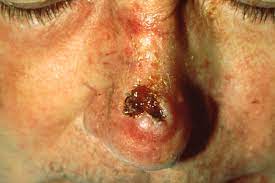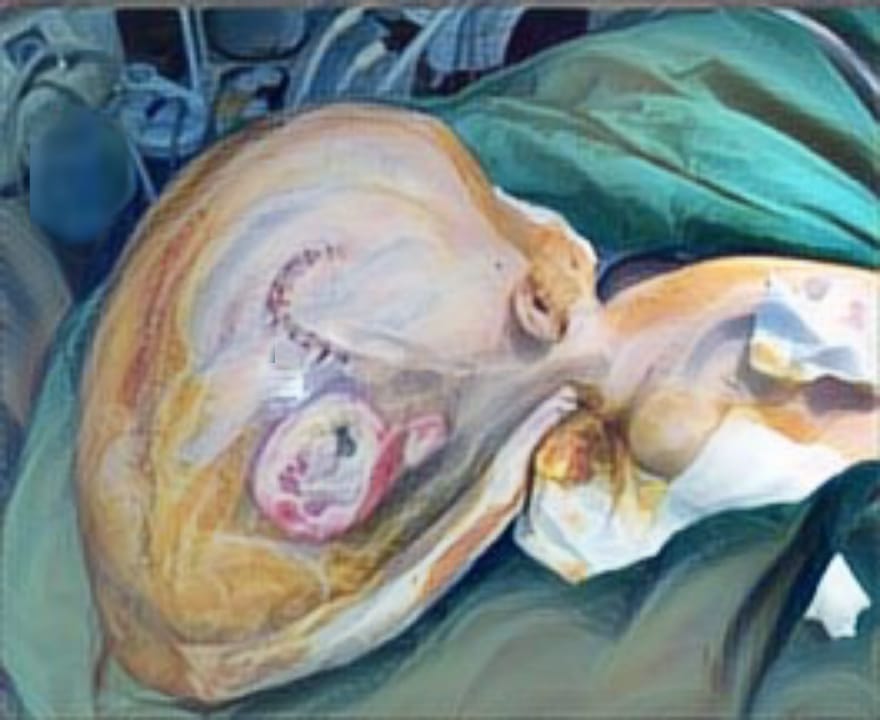META-ANALYSIS: SQUAMOUS CELL CARCINOMA CASES ARISING FROM MORBUS HANSEN IN DR. SITANALA CENTRAL HOSPITAL (2011-2021)

Downloads
Highlights:
- The majority of SCC cases were observed in males (86%), emphasizing a higher susceptibility of males to this form of cancer compared to females (14%).
- The study identified an increased risk of SCC particularly among individuals in the 46-55 and 56-65 age groups.
- The study revealed that a significant proportion of Morbus Hansen patients with SCC had a normal weight, while the occurrence of overweight and obesity was relatively low.
- Maintaining a healthy body weight may play a role in reducing the risk of SCC in this patient population.
Abstract:
Introduction: Leprosy, a chronic systemic infection caused by Mycobacterium Leprae, has been associated with the development of cutaneous neoplasms, such as squamous cell carcinoma. The aim of this study was to examine the characteristics of patients diagnosed with squamous cell carcinoma arising from Morbus Hansen (leprosy).
Methods: A retrospective analysis of medical records from Dr. Sitanala Central Hospital was conducted, focusing on patients diagnosed with squamous cell carcinoma arising from Morbus Hansen over a 10-year period from 2011 to 2021. Descriptive analysis was performed on the collected data.
Result: In this study, out of the twenty-one patients, the majority were male (86%), and the most common age group affected was between 46 and 55 years, accounting for 43% of the cases. Most patients had Morbus Hansen type BL (borderline lepromatous) and had been living with the condition for an average of 23 years. Additionally, a significant number of patients had a normal body mass index (52%) within the range of 20-24.9. Anemia was the main comorbidity observed, affecting 46% of the patients.
Conclusion: Examining the clinical profile of these patients helps healthcare providers identify specific characteristics associated with this condition, further research with more comprehensive data is necessary to ensure accuracy. Future studies could also explore potential connections between hypertension, anemia, and squamous cell carcinoma arising from Morbus Hansen.
World Health Organization. Global leprosy update, 2017: reducing the disease burden due to leprosy. Wkly Epidemiol Rec. 2018;35(93):445–56.
World Health Organization. Global leprosy (Hansen disease) update, 2019: time to step-up prevention initiatives. Wkly Epidemiol Rec. 2020;36(95):417–440.
Lastória J & de Abreu M. Leprosy: a review of the epidemiological, clinical, and etiopathogenic aspects – Part 1. A Bras Dermatol. 2014;89(2):205-18
Richardus J & Smith T. Squamous cell carcinoma in plantar ulcers in leprosy. A case-control study. Lepr Rev.1993; (64) 270-274
Nassaji H. Qualitative and descriptive research: Data type versus data analysis. Language Teaching Research. 2015;19(2):129-132.
Kemenkes Republik Indonesia. Profil Kesehatan Indonesia 2019. 2020
Nuttall F. Body Mass Index Obesity, BMI, and Health: A Critical Review. Nutrition Today. 2015;50(3):117-128.
Ridley D, Jopling W. A CLASSIFICATION OF LEPROSY FOR RESEARCH PURPOSES. Leprosy Review. 1962;33(2).
Aggarwal R, Ranganathan P. Study designs Part 2 – Descriptive studies. Perspect Clin Res 2019;10:34-6.
Seretis A, Cividini S, Markozannes G, Tseretopoulou X, Lopez D, Ntzani E, et al. Association between blood pressure and risk of cancer development: a systematic review and meta-analysis of observational studies. Scientific Reports. 2019;9(1).
Tsamara FR, Brigitta SR, Setiawan A. and Sugiharto S. Limb amputation in squamous cell carcinoma patient with history of leprosy. Science Midwifery, 2023;10(6):4837-4844. DOI: 10.35335/midwifery.v10i6.1117.
Kemenkes RI. (2018). Hapuskan Stigma dan Diskriminasi Terhadap Kusta. InfoDATIN Pusat Data dan Informasi KEMENTERIAN KESEHATAN RI.
Hannan M, Notobroto HB, Hargono R, Hidayat S, Afiyah RK, & Hasina SN. The effect of health worker support and self-efficacy on self-care agency of lepers in Indonesia. International Journal of Health Sciences, 2022; 6(3):1240–1248. DOI: 10.53730/ijhs.v6n3.11988
Ridley DS, Jopling WH.Classification of leprosy according to immunity. A five-group system. Int J Lepr Other Mycobact Dis, 1966;34:255-273
Nath I, Saini C, & Valluri VL. Immunology of leprosy and diagnostic challenges. Clinics in Dermatology,2015; 33(1):90–98.DOI:10.1016/j.clindermatol.2014.07.005
Copyright (c) 2023 Francisca Victoria, Sweety Pribadi

This work is licensed under a Creative Commons Attribution-ShareAlike 4.0 International License.
JURNAL REKONSTRUKSI DAN ESTETIK by Unair is licensed under a Creative Commons Attribution-ShareAlike 4.0 International License.
- The journal allows the author to hold copyright of the article without restriction
- The journal allows the author(s) to retain publishing rights without restrictions.
- The legal formal aspect of journal publication accessbility refers to Creative Commons Attribution Share-Alike (CC BY-SA)




















